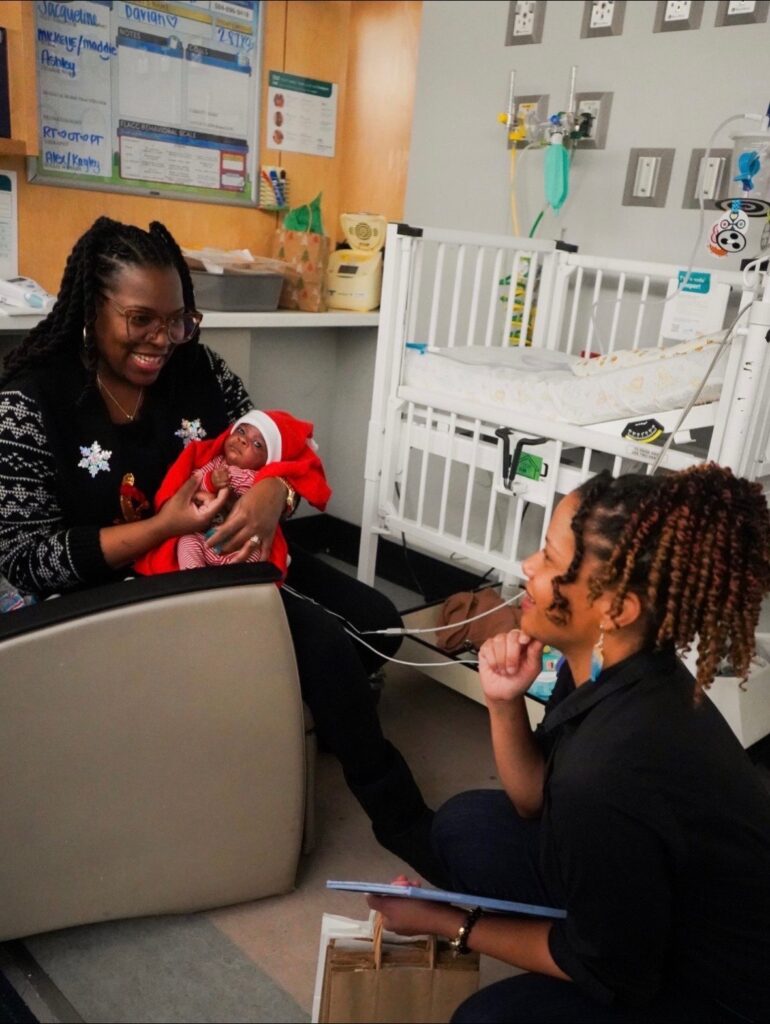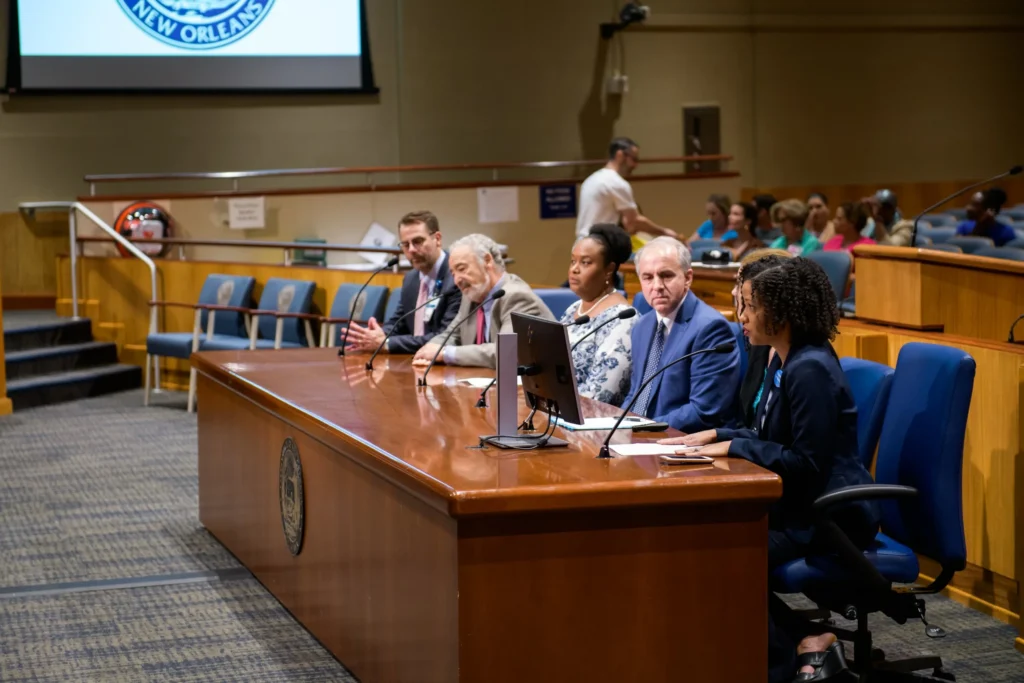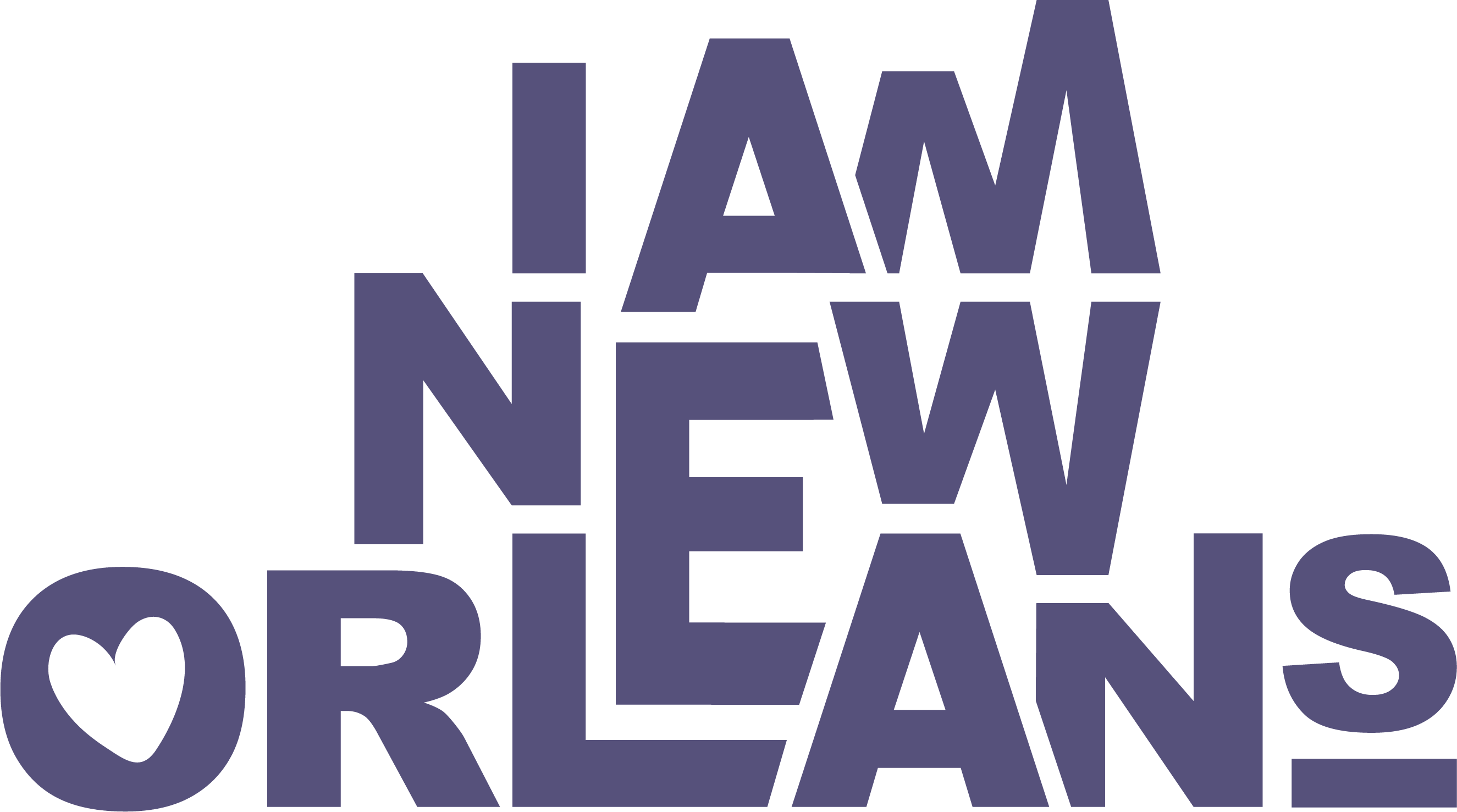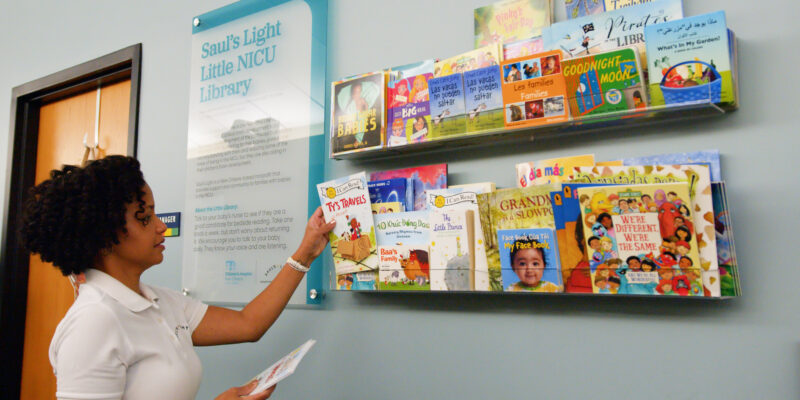How one New Orleans mother turned personal loss into collective healing — and is reshaping maternal and infant health for the next generation.
Nearly two decades after Hurricane Katrina, the people of New Orleans continue to be a testament to hope, ingenuity and perseverance. Communities have done more than rebuild — they are reimagining systems to create opportunity for all, especially children. While significant progress has been made, critical work remains to ensure that growth is truly equitable and lasting. As part of an ongoing reflection series called Rooted In Us, W.K. Kellogg Foundation (WKKF) staff and local leaders will share their perspectives on community efforts, lessons learned and the investments still needed to build a future where all New Orleanians can thrive. WKKF has been investing in New Orleans since the 1940s but named the city a priority place after Hurricane Katrina. As we look ahead, we remain committed to working alongside partners to strengthen economic opportunity, racial equity and community leadership for generations to come.
After Hurricane Katrina, rebuilding New Orleans wasn’t just about restoring infrastructure — it was about rethinking care. Who is supported in crisis? Who is centered in our health systems? And what does dignity look like for families navigating birth, loss and everything in between? Saul’s Light emerged in that space of questioning and rebuilding, working to transform how maternal and infant health is experienced in New Orleans and throughout Louisiana. Over the past decade, the organization has become a trusted advocate for families and a driver of systems change — partnering with hospitals, shaping policy and creating spaces for healing rooted in equity and compassion.
In an interview with WKKF, Saul’s Light Founder and Executive Director Kimberly Novod reflects on how the work began, how it’s evolved and what it takes to build a more just and inclusive future for families.
Novod’s story and the origins of Saul’s Light
Curro: I’m starting with something personal. Saul’s Light began with your own experience as a NICU mom. Can you share a little bit about that time — what you and your family went through, and how that journey led to creating Saul’s Light?
Novod: Absolutely. In 2014, my son Saul was born prematurely, and he spent some time in the NICU—the neonatal intensive care unit—before he ultimately passed away. As you can imagine, the experience was completely traumatic. I had what you could call a textbook pregnancy — everything was going right. I was nearing the end, preparing to have a child and imagining what life would be like. Then, I was completely blindsided.
I was unprepared for his early birth and completely unprepared for the NICU. It’s such an odd environment. It has its own language, its own sounds and smells. It was sensory overload. And then, to ultimately lose him — it was just surreal. I couldn’t believe it was happening. It felt like a dream — or rather, a nightmare. I kept thinking, “This can’t be happening. How did things go so wrong, so quickly?” When you set out to have a family, you never imagine that it could end with you leaving the hospital without your baby. But every single thing that could go wrong did.
What it showed me is that this isn’t just my story. This is happening all the time in our community. Women are giving birth prematurely every day — especially Black women. Some of those families will take their babies home, and everything will be okay. Some will take their babies home but encounter significant struggles due to their baby’s premature birth. And quite a lot of families will experience loss.
If this is happening at such a high rate — with high rates of prematurity and infant mortality — then there has to be something to provide comfort and community. Something to help families like mine. Something to help them navigate the NICU, to learn how to parent in that high-stakes environment. Because even in the NICU, you’re still a parent. It might not feel like it, but you are.
And then, when you lose a child — how do you even begin to navigate that loss? How do you integrate that experience into the rest of your life?
I think my experience really showed me the power of community — and how it can shape a family’s life trajectory after something like a NICU hospitalization or loss. It also shapes the healing journey.
People suffer in isolation. I know I did. But through support and shared experiences, NICU families can learn how to integrate that overwhelming trauma into their lives — without it destroying their mental health, their relationships or their ability to parent. That experience never really ends. It continues to impact you long after the moment has passed.
Curro: I’ve read your story, seen clips and heard it many times — but hearing you say it always gives me chills. Thank you. I know you must tell this story often, and I deeply appreciate you sharing it with me.
Novod: Thank you for saying that. It doesn’t get easier, but like many people with a mission or a calling, I feel like everything I do is for a greater cause. This is the one I’ve chosen, and it comes with everything — the grief, the purpose and the commitment.
Systems change and healing
Curro: Saul’s Light offers practical support, but it also feels like something deeper. You talk a lot about dignity, grief and healing. What does it look like to build a system that truly centers families in moments of crisis — not just as patients, but as whole people?
Novod: The larger purpose of our organization is to make things better for the families who come after us. I knew early on that my part wouldn’t be in medicine — I’m not a doctor or a nurse. But I asked myself, “How can I help?” I realized I could use my voice, my story and Saul’s story to advocate for families. To provide direct services. And to bring awareness to prematurity, infant loss, racial disparities and mental health. That’s my part. I can’t stop prematurity, and I won’t be the last to experience loss. But I can help ease the burden.
For us, systems change means recognizing the people in our community who’ve gone through the NICU experience, who empathize with it — and building community with them. It means protecting the dignity of every family, whether it’s the baby in the incubator or the parent standing beside them. They all deserve empathy, respect and compassion just for existing inthat space.
When families enter the NICU, they bring their entire identity with them — their language, race, history and experiences. And when those families face additional barriers — whether it’s not speaking English, facing racial bias or dealing with substance use disorder — it makes everything even harder. And it shouldn’t.
Empowering families to say, “I deserve empathy and respect,” also empowers healthcare professionals to respond with care. That’s what we strive for. We’ve been able to do this work through deep collaboration — within the community and with healthcare partners. Life, death, grief, healing — they are all part of healthcare. We go to the hospital expecting to be “fixed,” but sometimes healing looks different than we imagined.
We prepare for birth, but we should prepare for death, too — not because it’s easy, but so that it’s less scary and more meaningful. Even short lives have meaning. A baby who dies didn’t “lose.” It’s not a failure. It’s part of life.

Katrina’s legacy, advocacy and the future
Curro: Zooming out a bit — since Katrina, we’ve seen progress in maternal and infant health in New Orleans, but persistent gaps remain. In your view, what has changed over the past 20 years, and what still needs to be rebuilt or reimagined — especially for families with medically fragile babies?
Novod: Katrina will always be a monumental event for New Orleans. It continues to reveal lessons about preparedness, quality of life and sustainability. We’ve made real gains in education and healthcare — and we’ve responded to some of those lessons. Hopefully, outcomes would be different if we faced something similar today.
But maternal and child health still needs more attention. The racial disparities are stark. In Louisiana, Black women are 50% more likely to have a preterm baby than White women. That tells us there’s a gap in care — both in access and in quality. When we invest in women’s health, we improve infant health, family well-being and community outcomes. Women need tools to advocate for themselves, to be heard, to get their questions answered — and that takes time and quality care. We can’t claim success until we start eliminating these disparities.
Curro: You’ve said before that caring for one family isn’t enough — we need systems change too. How does Saul’s Light push for that change — whether it’s within hospitals, through policy, or by shifting how providers view families?
Novod: First and foremost, we’re a community-facing organization. Our main goal is to support families who have a baby in the NICU or have experienced infant loss. We provide direct services and ensure families have the resources they need to parent their babies and care for themselves. But we also focus heavily on advocacy. That means helping families advocate within the hospital system and for their mental health — and also engaging them as part of something larger. Mobilizing families to understand their power — to speak at the Capitol, to write letters, make calls, run for office.
I’ve seen the impact when families share their stories with lawmakers. It makes a difference. We also work with healthcare professionals to transform healthcare — toward something more compassionate, equitable and trauma-informed. That’s essential in a city like New Orleans, where trauma from Katrina still lingers.
When families show up at the hospital, they’re carrying all their prior experiences — not just health-related ones. Healthcare needs to recognize that. Our job is to help families be handled with care.
System change also means thinking upstream. How can we prevent crises before they happen? Can we educate people about recognizing signs of preterm labor? Create community-based solutions? Work with lawmakers and everyday people to ask: What do we want Louisiana to look like 20 years from now? If prematurity and infant mortality are still plaguing us in two decades, then we haven’t done enough.
Curro: Indeed. And when you engage families in education or mobilization efforts, what barriers do they face in accessing or using their voice?
Novod: The biggest barrier is time. Legislative committee meetings often happen at odd hours — during the workday or with short notice. That makes it almost impossible to plan for. What we see is that lobbyists can show up, but everyday people often can’t. When we do get advance notice, we reach out to the community to see who’s interested in showing up and speaking out.
Another barrier is transportation. Louisiana is mostly rural, and Baton Rouge is far from many places. Even from New Orleans, if you don’t have reliable transportation, it’s hard to be there. There’s also a sense of apathy — people feel like government and policy are things happening to them, not something they can influence. I want people to realize their power — individually and collectively.
We all want the same things: safe communities, good schools, decent jobs and affordable homes. When we realize that, we can build real change together.
Curro: After so many years doing this work, what are you most proud of?
Novod: This is our 10-year anniversary, which is a huge milestone. We’ve grown from a passion project into a full-fledged organization rooted in community, offering both direct services and advocacy. I’m especially proud of our legislative work — like the stillbirth tax credit and the donor human milk laws for medically fragile babies. Those laws are for all families in Louisiana. They’re about the future.
When we first started advocating, people told us we wouldn’t succeed. But we did. We passed the tax credit on the first try. The next year, we passed the milk donor law. Now families are already benefiting — and many more will in the future. That’s beyond my wildest dreams. And now I’m a bit obsessed with it. I think now, “What else can we do?” So, we’ve been working with a lot of people in coalition that are trying to pass paid family leave. It just goes to show that we’re stronger together and there’s some things that we can all agree on. It doesn’t matter if we live in a city or if we live in the country. If we’re White or Black or Republican or Democrat.
We’re also proud of our hospital partnerships — with Ochsner and Louisiana Children’s Medical Center (LCMC). The path to health equity runs through collaboration between hospitals and communities. And we’ve been fortunate to work with people in those systems who believe in our mission.
Curro: You were recently interviewed by Trymaine Lee for his documentary “Hope in High Water: A People’s Recovery 20 Years After Hurricane Katrina.” What was it like to share your story in that context?
Novod: It was intense. I hadn’t realized how much of that time I’d locked away. Katrina is a hard topic. Like many New Orleanians, I don’t watch documentaries or read about it because it’s so painful. But talking with Trymaine was healing. I allowed all those feelings to come back, and I think that’s important. I often tell people: you can’t keep grief at bay forever. You have to let it in, understand it and let it pass. That conversation helped me do that. It was emotional — I ugly cried! But it reminded me that we made it. We’re still here. And that’s something to be grateful for.
Curro: I saw a clip — and you are a beautiful crier. But seriously, it was powerful to watch. Thank you again for sharing something so personal.
Novod: Thank you for saying that. It was a full-on ugly cry, and it came out of nowhere. But I needed it.
Curro: OK, shifting gears a bit — as part of this Katrina 20 anniversary, we’re spotlighting community-led infrastructure. What role do organizations like Saul’s Light play in building maternal and infant health systems that truly reflect the lived experience and leadership of Black women and families?

Novod: I think our role is to create a space that encompasses the full spectrum of birth and maternal and child health. Typically, when we talk about maternal health or birth, we rarely consider what happens when things don’t go as planned.
If a baby is born early, ends up in the NICU or passes away — we tend to ignore those stories. And when we do that, we do a great disservice to the people who experience them.I have no doubt that these experiences negatively impact the mental health of women — especially Black women. They often internalize the idea that something is wrong with them, that they did something wrong or didn’t do enough. And that leads to women suffering in silence.
It’s not just the loss of a baby — it can be the loss of a pregnancy. Having a preterm baby means your pregnancy ends before it’s supposed to, and that’s traumatic. And many people don’t know where to turn. Those who haven’t gone through it may not understand. They may say, “Well, your baby came home, so everything’s fine,” or, “You can try again.” That kind of response completely overlooks the grief and the trauma.
What we do at Saul’s Light is create space for families’ stories. We recognize that birth justice is a spectrum — and everything in that gray space matters. We are the people you call when you’re in that space. It helps families to know that we’re a Black woman-led, community-based organization. We’ve been there. They can trust us. And we’re not just dedicated to individual families — we’re dedicated to the broader community, to the city and to the state.
We also help raise the conversation around how all aspects of life intersect. For example, people don’t always think about how environmental injustice impacts prematurity. But I’ve been connecting with groups like RISE St. James to explore how climate change, rising heat levels and hurricanes all influence outcomes like preterm birth.
All these issues are interconnected. What might look on the surface like just “prematurity” is actually the tip of the iceberg. And underneath that surface is a whole structure of injustice that needs to be addressed if we want to fix what’s visible.
Curro: That’s a compelling analogy. Ending on a forward-looking note — what does a truly just and inclusive maternal and infant health system look like to you? And as you look to the next 20 years, what are we building toward? What do you want funders, health systems and policymakers to understand — not just about crisis response, but about what families need every day?
Novod: Preparing only for the crisis is the wrong approach. If we prepare beforehand, we can prevent the crisis. A just and inclusive maternal and infant health system is one where most babies are born full- term and healthy to begin with. It’s one where mothers don’t just survive birth — they thrive. Giving birth should be a normal, safe part of life. You shouldn’t have to wonder if you or your baby are going to die.
In the next 20 years, my hope is that Saul’s Light works itself out of a job — because families have what they need. They have equitable access to quality care, prenatal support and education.
Until then, we’ll keep going. These issues didn’t start with us, and they won’t end with us — but we’re not allowed to stop. Our job is to do the work we can, especially in that critical 0-3-year window that includes the mother-baby dyad.
I want funders, policymakers, hospitals and communities to understand that every family deserves a healthy start. And if they don’t get that healthy start, they need a safety net that works — one that includes education, child care, housing and healthcare that’s delivered with dignity.
We need policies that support families: paid family leave, support for breastfeeding and advocacy for violence prevention — including around gun reform. These are the issues keeping our communities unsafe, and they deserve our full attention.
Curro: Well said. I’m so appreciative of the time you took today. Is there anything else you’d like to add?
Novod: I appreciate this conversation — it’s a chance to reflect deeply on where we’re going as an organization. Especially as we mark milestones like the 20th anniversary of Katrina, it’s important to look ahead. And it reminds me: the talent, ideas and innovation — they’re here in New Orleans.
If we want to improve any sector — health, education, environment — the solutions are already in this city. We just need people to invest in us, to trust us and to align resources with community leadership.
We love this city. It’s who we are. And like Katrina taught us, we don’t give up. We stay. We fight. We rebuild. We get into good trouble. Because what’s on the line is the most important thing of all: our children — and their future.
Want to learn more about Saul’s Light and its work to support families, shift systems and build a more compassionate, equitable approach to maternal and infant health in New Orleans? Visit saulslight.org to explore its programs, impact and ways to get involved.


Comments